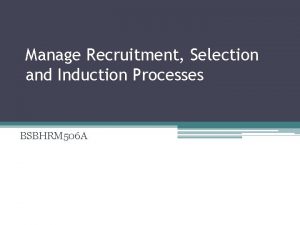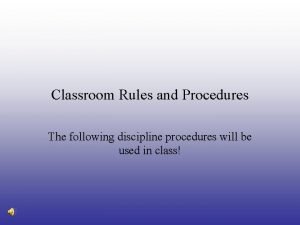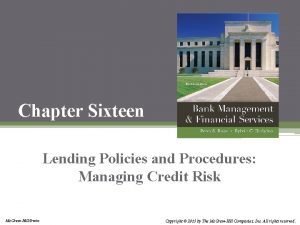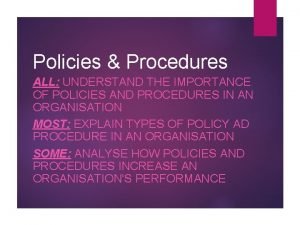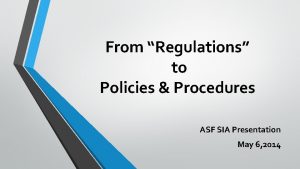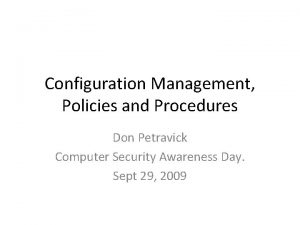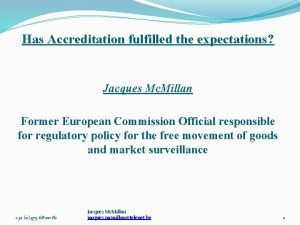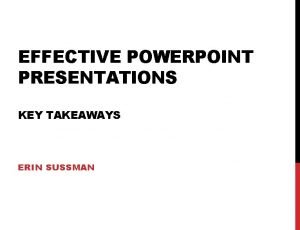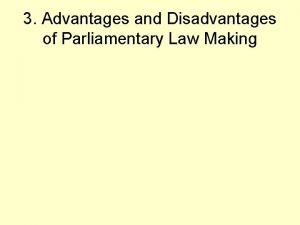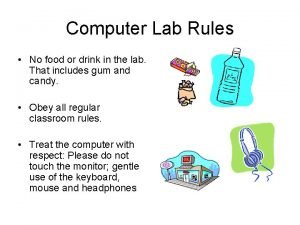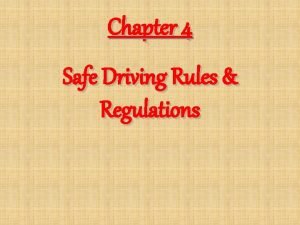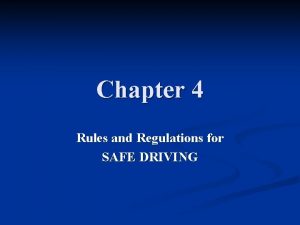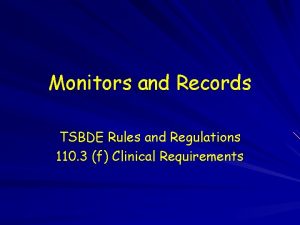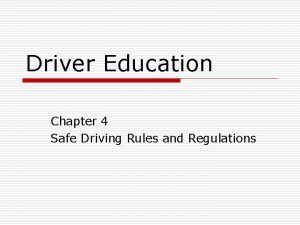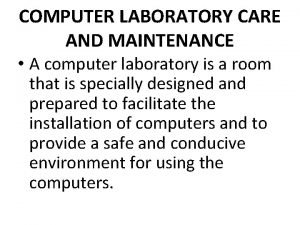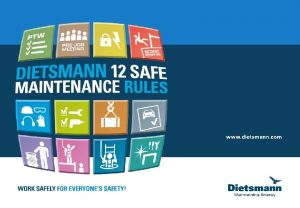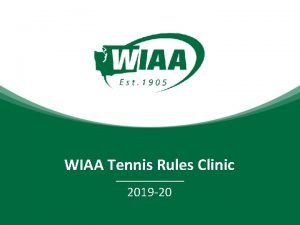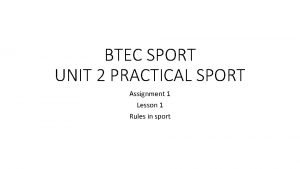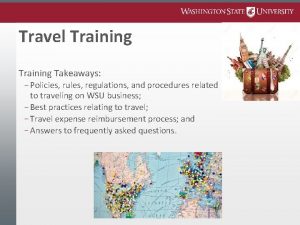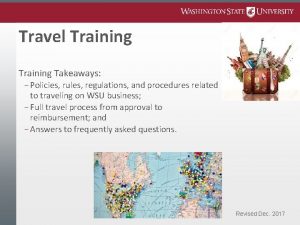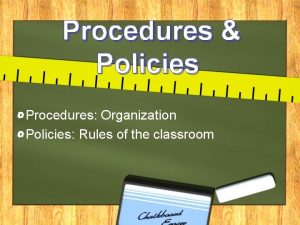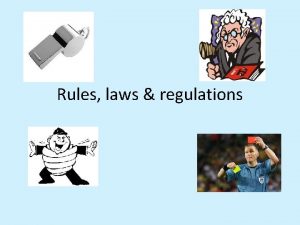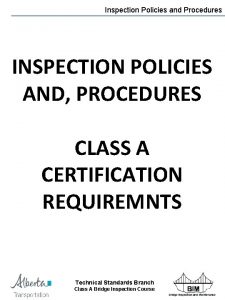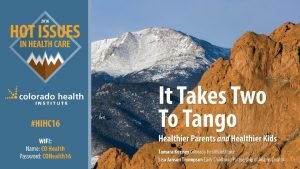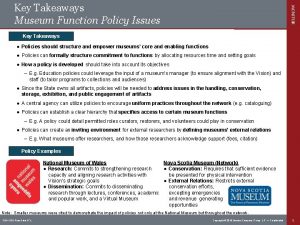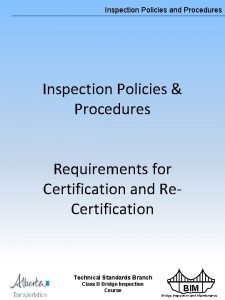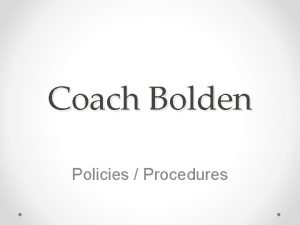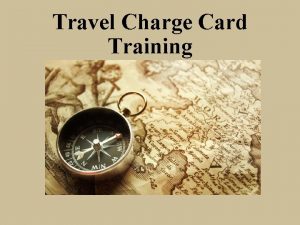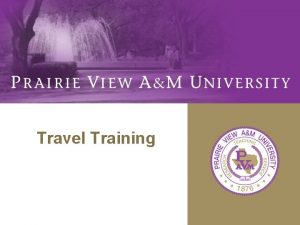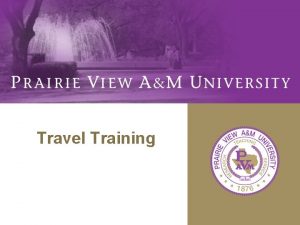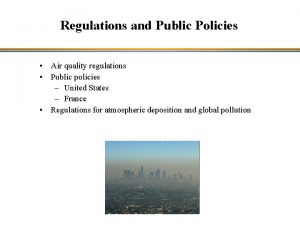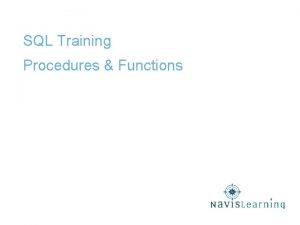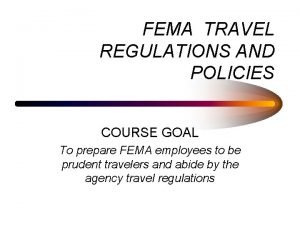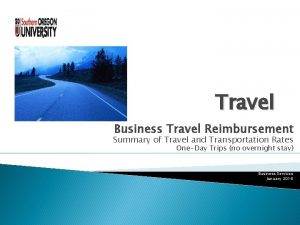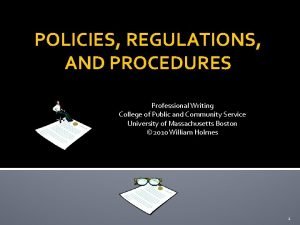Travel Training Takeaways Policies rules regulations and procedures
























- Slides: 24

Travel Training Takeaways: – Policies, rules, regulations, and procedures related to traveling on WSU business; – Best practices relating to travel; – Travel expense reimbursement process; and – Answers to frequently asked questions. Revised June 2017

Agenda • Travel Preparation – Approval – Travel Authority (TA) – Travel Advances – Prepayments/Deposits • Travel Expenses – Meals – Lodging – Transportation – Speaker Fees/Honorariums – Employee Relocations • Payment Methods & Reimbursement – Central Travel Accounts (CTA) – Corporate Travel Card – Other Options – Travel Expense Voucher (TEV) • Frequently Asked Questions – Unallowable Expenses – Spousal Travel – Student Employees – Personal Time

TRAVEL PREPARATION

Approval to Travel • Prior approval is required for ALL official University travel. • Written documentation is required for the following: – All nonemployee travel (i. e. student, speaker, applicant); – Requesting a travel advance; – Paying conference registration fees in advance; – Out of state/country travel; – If an exception to the policy is requested; – If privately-owned, rented, or chartered aircraft will be used; or – If travel is partially or entirely supported by funds not administered by the WSU Controller’s Office. • In all other cases verbal approval is acceptable. *Note: Individual departments may require all travel have prior approval documented in writing.

Travel Authority (TA) • The official WSU TA form must be used when: – Routing a travel advance request through Travel Services; or – Routing a conference registration payment through Accounts Payable. • Departments may use substitute forms for all other written approvals as long as all of the required data is collected. – These are to be retained by the department. • A blanket TA can be used, and renewed annually, if the following remain the same: – Traveler(s); – Location; and – Estimated costs (i. e. rental car, meals, lodging). • For executive-level employees blanket TAs may be used to cover all travel. Maintain a travel log for each trip for proper tracking.

Travel Advance • Policy states that advances should be for faculty and staff employees only. – Exceptions for students can be granted if approved by the responsible dean or director. All student advances must be guaranteed with discretionary funds. • May not be requested if the period of travel is less than 15 days. • Advance cannot be paid out more than 14 days before the start of travel. • The traveler may not have any outstanding advances when requesting a new advance. • A TEV is prepared after the trip to clear the advance. – If the traveler was advanced more than they spent they have to send a check for the difference.

Prepayment/Deposits • State law does not allow for payments to vendors in advance. • If a deposit or prepayment is required to reserve lodging send an exception request prior to agreeing or paying to ensure you can be reimbursed. • Whenever there is an agreement or contract it needs to be vetted by the Contracts Office.

TRAVEL EXPENSES

Travel Status Travel status begins when the traveler leaves his or her official station or official residence.

Meals • Reimbursement for meals during one day trips is provided if the traveler is in travel status for their entire regularly scheduled work shift plus an additional three hours, known as the Three-Hour Rule. – Ex. Shift: 8 am to 5 pm (assumed unless otherwise noted on the TEV). • Travel Status: 10 am to 10 pm, would not receive reimbursement. • Travel Status: 7 am to 7 pm, would receive taxable reimbursement. • Actual cost can be used as the basis for reimbursing meals as long as it is stated on the TEV and does not exceed maximum rates. – If multiple people are on one check the names of each attendee is required to be submitted with the reimbursement. – Preference is for each traveler to pay for their own meals. • Visit the following sites for applicable maximum rates by location. – Continental U. S. : https: //www. gsa. gov/portal/content/104877 – Non-continental U. S. and Foreign: https: //aoprals. state. gov/web 920/per_diem. asp

Lodging • Reimbursed at actual costs not to exceed maximum lodging rates for the location and month staying (rates found on the sites listed on the ‘Meals’ slide). – For exceptions see 95. 06 and include reference on the TA & TEV. • Cannot be reimbursed for lodging facilities located within 50 miles of either the traveler’s official station or official residence (whichever is closer to the destination). • Lodging expenses are not able to be reimbursed prior to the trip. – Work with Travel if deposits are required prior to the trip to ensure you can be reimbursed up front. Include Contracts if T&Cs are needing to be signed. • State regulations have deemed shared lodging venues (i. e. Air. BNB, VRBO) as acceptable lodging facilities. – All fees, e. g. cleaning and service fees, must be added to the total amount to calculate the full nightly rate to compare to per diem. – Travelers need to be aware of early departure/arrival fees and cancellation fees when booking as these are not covered by WSU. – Traveler assumes risk for safety and quality of the venue as it may not be required to comply with the same requirements of commercial lodging.

Transportation • When transportation on a scheduled airline is available, tourist-class air fare is the maximum amount that is reimbursed regardless of the mode of transportation actually used. – If a slower mode of transportation is used, the traveler must use the appropriate leave status for the difference in travel time (i. e. annual leave). – Use US air carriers whenever possible. • When using a privately-owned motor vehicle the traveler can be reimbursed up to the applicable rate for each mile driven, see 95. 11. – WSU will not reimburse for standard commute miles, regardless of hours travelled. • When using a rental car it is expected that it will be booked on our state contract with Enterprise/National Rent-A-Car when possible, see 95. 12. – See: https: //travel. wsu. edu/cars. html or https: //www. enterprise. com/en/home. html – Corporate Number: 45 WA 000; Pin: WAS • When booking other modes of transportation (i. e. chartered buses, rail fare, etc. ) ensure WSU policies are followed in selecting the most economical options.

Speaker Fees/Honorariums • Process for authorizing speaker fees/honorariums depends on the fee amount. – If over $10 K complete a Departmental Requisition. – If under $10 K complete a Travel Authority. • Billing for the speaker fees/honorariums depends on if travel expenses are included. – If the claim includes travel expenses the department prepares a Travel Expense Voucher and enters the fee amount in the Other Expenses section. – If the claim does not include travel expenses the department uses a State of Washington Invoice Voucher. • If the speaker is a non-resident WSU will withhold 30% of the fee per IRS rule. For this we need the following before processing payments: – Visa Type; Country of Citizenship; Date of Birth; SSN

Employee Relocations • Three University departments deal with processing relocations: – Purchasing Services processes moves of household goods (State and Self Moves); – Travel Services process travel expenses related to a relocation, e. g. transportation, meals, lodging; and – Payroll Services processes reimbursement for taxable relocation expenses (as outlined below). • For a list of Nontaxable Relocation Expenses see 70. 61 and for a list of Taxable Relocation Expenses see 70. 62. • The following relocation expenses are always taxable and to be supported with 17 A accounts only: – All expenses incurred during house hunting trips prior to the move; and – All spousal and/or dependent’s relocation expenses (i. e. per diem, airfare).

PAYMENT METHODS

Central Travel Account (CTA) • The CTA is a ghost card that is housed in the Controller’s Office. • Preferred method to use to purchase airfare, rail fare, bus fare, and charter buses; all other transactions are prohibited on the card. – Benefits department and traveler because it does not require reimbursement. • Department responsibilities include: – Timely on-line reconciliations; – Maintaining a log sheet and supporting documents for all transactions; – Providing authorization to appropriate department personnel to use the CTA; and – Communicating changes in primary contact to Travel Services.

Corporate Travel Card • The Travel Card is a personal liability Visa card that eliminates the need to use personal resources for business travel. • Full balance of statement has to be paid within two cycles in order to avoid late fees. – An additional cycle is provided to account for the time it takes to process reimbursements. • Cardholder responsibilities include the following: – Ensuring all transactions are for official travel related expenses; – Preparing the proper documentation for reimbursement of expenses and, in turn, paying all the charges on the card; – Reporting lost or stolen cards; – Notifying Travel Services when leaving WSU so the card can be cancelled; and – Ensuring the card is active and current prior to leaving for a trip to avoid any issues.

Other Options • Direct bill from vendors can be used for: – Rental cars for non-employees; and – Lodging for all non-employees, employees accompanying non-employees and/or students, or when five or more employees are booking a block of rooms. • The Purchase Card (PCard) can be used in the following situations: – For conference registration fees, with the PCard being the preferred method; – For any travel expenses for non-employees, excluding airfare; and – For employee travel expenses, or airfare purchases, an exception request needs to be sent to the Purchase Card Manager for approval. • Travelers are able to use their own personal resources for all travel related expenses. – Only airfare and conference registration fees may be reimbursed prior to traveling.

Travel Expense Voucher (TEV) • Prepare a TEV for the following: – To claim reimbursement for travel expenses; – To report and account for travel advances; and – To account for travel supported by third-parties. • Best practice is to have one TEV per trip per traveler. – Back to back trips can warrant one TEV for two trips. – In group travel, each traveler should pay for their own travel related expenses. If this cannot happen appropriate information needs to be included in the Travel Details to document who had expenses paid for and why. • All WSU employees seeking reimbursement should utilize the E-forms system for efficiency. This allows for electronic document retention and significantly reduces processing time from initiation to payment. – For user guides: http: //public. wsu. edu/~forms/eforms. html

Travel Expense Voucher (TEV) Cont’d • Non-employees, including students, have to use paper TEVs. – You can create a draft in the E-forms system to fill out the TEV and print to route for approval. – Original signatures and receipts are required for paper TEVs. • The TEV has to reference trip dates and locations in the Trip Information in order to properly calculate per diem. – If per diem is exceeded for lodging the checkbox needs to be marked and the rule number entered. • Receipts showing the charge was paid in full are required for all miscellaneous expenses exceeding $50. – Supplies purchased while in travel status that exceed $50 need to be placed on a PCard, or reimbursed using an invoice voucher and processed through AP. • For audit purposes, the Travel Details section needs to include additional information for anything that is outside, or may be perceived as being outside, of standard policy.

FREQUENTLY ASKED QUESTIONS

Frequently Asked Questions • Can I be reimbursed for…. ? – Seat upgrades: No, this is a personal preference item. – Limo services: With proper justification included on the TEV. – Travel insurance/protection: No, personal preference item. – Change fees: With proper justification included on the TEV. – Airfare purchased with miles: No, would be a cash gain for the traveler. – Rental car upgrade: No, this is a personal preference item. • How is the mileage calculated when driving to the airport? – The daily commute of an employee is not reimbursable, all other mileage is. • Official Residence (OR): The city/town in which the employee resides. • Official Station (OS): The city/town in which the employee works. If approved to telework it is the location of that remote office, not the campus they are affiliated with. • Daily Commute: The first and last trip of the day within the location when the OR and OS are the same, or the first and last trip of the day between the locations when they are different.

Frequently Asked Questions Cont’d • For executive-level employees who have spouses travel, how do I account for their expenses? – All spousal travel needs to be coded to 17 A funds and are taxable fringe benefits. • Are student employees treated as students or employees when traveling? – If the trip is for a student/class activity they need to be treated as a student and follow those policies. – If the trip is for work purpose they need to be treated as an employee and follow those policies. • How do I account for personal time that is added to a business trip? – If booking a flight the roundtrip ticket to and from the location for the business trip needs to be priced out and documented for the days required by work to travel. WSU will reimburse up to that amount, the additional amount has to be covered by the traveler. • If using the CTA the traveler will have to write a check to WSU. – Meal per diems are for the days while in transit and any days during the actual business trip.

This has been a WSU Training Videoconference If you attended this live training session and wish to have your attendance documented in your training history, please notify Human Resource Services within 24 hours of today's date: hrstraining@wsu. edu
 Recruitment selection and induction policies and procedures
Recruitment selection and induction policies and procedures Classroom policies and procedures
Classroom policies and procedures Lending policies and procedures managing credit risk
Lending policies and procedures managing credit risk Importance of policies and procedures
Importance of policies and procedures Policies and procedures presentation
Policies and procedures presentation Configuration policies and procedures
Configuration policies and procedures Jacques van takeaways
Jacques van takeaways Key takeaways slide
Key takeaways slide Mathsbot differentiated
Mathsbot differentiated Advantages and disadvantages of parliamentary law making
Advantages and disadvantages of parliamentary law making Badminton vs table tennis
Badminton vs table tennis Class rules and regulations
Class rules and regulations No food or drink in lab
No food or drink in lab Child care facility rules and regulations answers
Child care facility rules and regulations answers If a motorist’s vehicle becomes disabled he/she must
If a motorist’s vehicle becomes disabled he/she must Chapter 4 safe driving rules and regulations
Chapter 4 safe driving rules and regulations Chapter 4 safe driving rules and regulations
Chapter 4 safe driving rules and regulations Head tilt chin lift jaw thrust
Head tilt chin lift jaw thrust Controlled uncontrolled and blind intersections
Controlled uncontrolled and blind intersections Curative maintenance definition
Curative maintenance definition Bwca rules and regulations
Bwca rules and regulations Dietsmann wikipedia
Dietsmann wikipedia Wiaa football rules
Wiaa football rules Rto rules and regulations
Rto rules and regulations Unit 2 btec sport level 3
Unit 2 btec sport level 3
